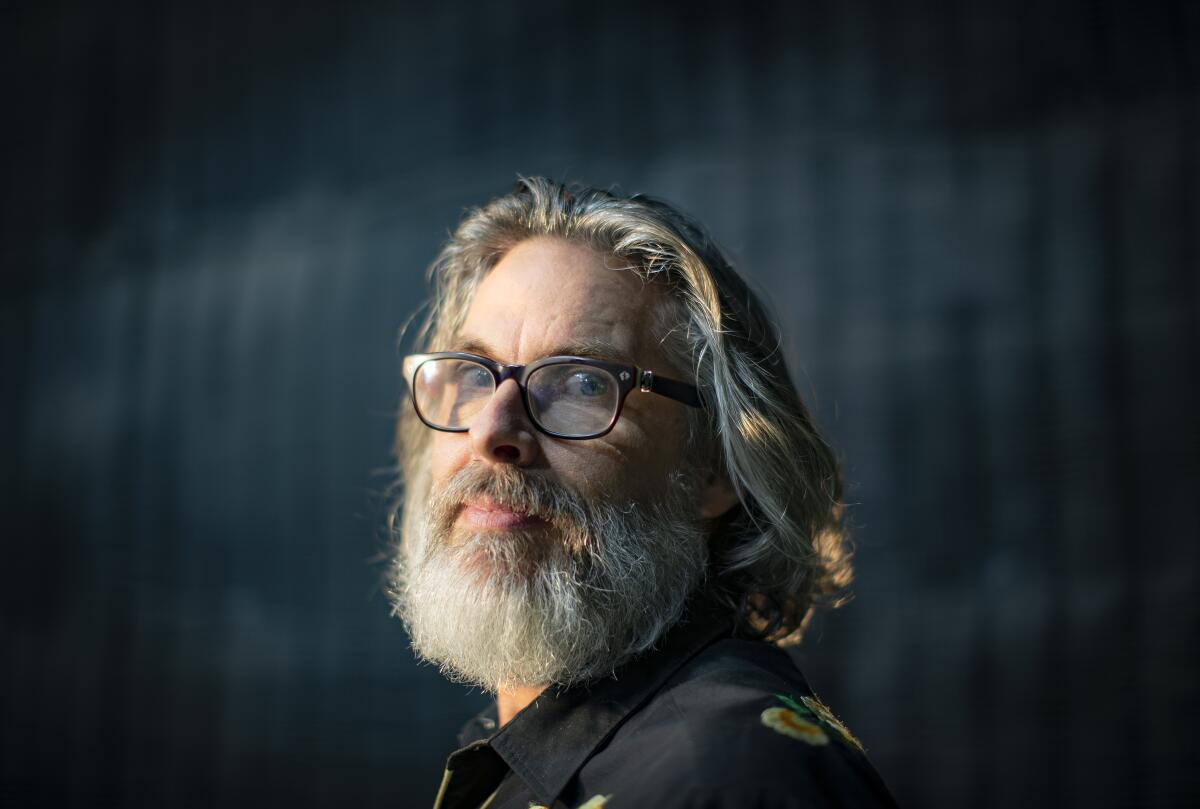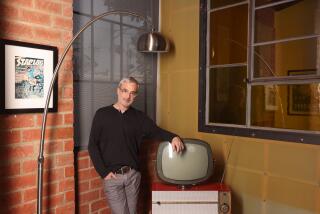Michael Chabon teleports into television with ‘Star Trek: Picard’

- Share via
The first episode of “Star Trek: Picard,” which aired Thursday on CBS All Access, announced the long-awaited return of the legendary Starfleet commander Jean-Luc Picard, played by the incomparable Patrick Stewart.
Picard’s familiar visage, along with his steely resolve and moral clarity, were welcomed back by jubilant fans who might not be as familiar with the series’ showrunner, acclaimed novelist Michael Chabon.
Fueling Chabon’s genre-defying works of fiction are passions and influences ranging from comic books to James Joyce’s “Finnegans Wake.” The writer credits his father for his eclectic taste. “He loved Japanese monster movies from Toho Studios and Bartok concertos,” Chabon said during a telephone interview. “He watched ‘General Hospital’ every day, and Thomas Mann was his favorite writer.”
In “Star Trek: Picard,” Patrick Stewart reprises his role as Jean-Luc Picard, and the results are satisfying indeed.
Chabon followed a similar path, pursuing his interests wherever they took him: “Whatever it is that fires your passion, fires your imagination, so be it.” His fluency in what was once called lowbrow and highbrow storytelling has made him the perfect writer for our time — and the perfect artist, at a moment when superheroes, con artists and gangsters compete for eyeballs and awards, to make the jump from page to screen.
On the page, Chabon has done it all: contemporary realism, historical fiction, epic fantasy for young adults, even a counterfactual hardboiled detective story set in Alaska. For the screen, he worked on “Spider-Man 2” and “John Carter” before going all-in with his wife, novelist Ayelet Waldman, on a multiyear production deal with CBS. Together, they will produce a new series for Showtime based on Chabon’s Pulitzer Prize-winning, comics-inspired novel, ”The Amazing Adventures of Kavalier & Clay.”
Chabon’s particular passion for “Star Trek” blossomed when he was 10, thanks to another great influence — a 17-year-old babysitter in Columbia, Md., who was a huge fan of Gene Roddenberry’s original series. After attending the first Star Trek convention in Washington, D.C., she brought back fanzines for her young charge, creating a fanboy who would later attract millions of fans of his own.
Chabon’s babysitter was black, and “Star Trek” was more than just a TV show to her. “She told me that Lt. Uhura meant a lot to her,” Chabon recalled. “That was part of my understanding that made the show special from the very beginning.”
“Star Trek’s” optimism about the future made it appealing to viewers during its initial run from 1966 to 1969, a time when there was plenty of bad news on TV. From the very beginning, Roddenberry’s progressive values and clear-sighted moral vision drove the show.
In “Star Trek: Picard” something is rotten in Starfleet, and the retired admiral finds himself on the outside looking in. Some diehard fans worry the franchise is being steered in a direction its creators never intended.
Sign up for our Book Club newsletter
Get the latest news, events and more from the Los Angeles Times Book Club, and help us get L.A. reading and talking.
You may occasionally receive promotional content from the Los Angeles Times.
“I think that’s a misconception,” Chabon said. “[‘Star Trek’] was never about how humanity becomes perfect; it was always about how humanity suffers and endures and works to overcome all that is inherently destructive in our nature.”
“Picard” picks up two decades after the conclusion of “Star Trek: The Next Generation,” which ran for an impressive 172 episodes. Four “Star Trek” films were released in the interim between the two series. Nevertheless, Chabon insisted that “Star Trek: Picard” won’t be difficult for newbies to follow. “One of the challenges that we set for ourselves was to try and make a show that would be welcomed by fans and would welcome nonfans,” he said.
That wasn’t the only obstacle. There is no template for a show about a 92-year-old space admiral. “I think it’s probably pretty unprecedented,” Chabon admitted. There were physical limitations to what Stewart, 79, could do. “We really learned by watching Patrick and listening to Patrick. From the very beginning, he told us, ‘I don’t want to do “Next Generation” again. I don’t want to do what I’ve done before, because I can’t.’”
These are not the kind of challenges a novelist has to deal with, but the rookie showrunner embraced them. “I think I can safely say I’ve never worked harder at anything,” he said. During the run-up to the season, Chabon did multiple 24-hour writing sessions, and once production started he routinely worked 18-hour days on and off the set. “I loved every single minute of it,” he said.
Earlier this month, CBS All Access announced it had renewed the series for a second season. Chabon will continue as a writer and executive producer, but “Star Trek: Picard” will have a new showrunner next season.
Instead, Chabon will transition to “The Amazing Adventures of Kavalier & Clay,” a project that’s been in Hollywood purgatory ever since its 2001 publication. The novel was optioned almost immediately and was finally greenlighted in 2006. Actors were cast and the production designer moved to London to begin shooting, but the movie didn’t happen.
Though Hollywood is famously a burial ground for successful novelists — F. Scott Fitzgerald, William Faulkner and Nathanael West, to name a few — Chabon was determined not to let that happen to him.
“In an effort to protect myself from being crushed,” he said, “I went into it with this mercenary attitude, but along the way I succumbed. I made the mistake of starting to really care about writing really good screenplays … and trying to make an object that was really a worthy piece of work. Once that happened, that’s it. I was screwed!”
Although he’s committed to bringing his visions for “Picard” and “Kavalier & Clay” to the screen for the foreseeable future, Chabon hasn’t given up on writing fiction.
“The world’s got plenty of novels,” he said. “I won’t have lost any novels to working on ‘Star Trek.’ The novel I’m working on is the novel I would have been working on. It doesn’t feel like an either-or to me.” (He and Waldman co-edited an anthology, out this month, titled “Fight of the Century: Writers Reflect on 100 Years of Landmark ACLU Cases.”)
Chabon attributes his adventures with “Star Trek” to a desire to shake things up in his life. “I entered my 50s with an attitude that I’m going to say yes to more things that I probably would have said no to earlier because I was making writing novels a priority.” He’s even worked with the musician Mark Ronson on an album. “That was a huge change,” he explained, “because it was very much a collaborative thing and I loved it.”
Beyond his deal with CBS, Chabon doesn’t know what’s on the horizon, and that’s just fine with him. “Maybe what I’ll do is keep saying yes to things. Maybe 10 or 15 years from now I’ll say, ‘OK, enough yes, let’s go back to no.’”
Jim Ruland’s book with the punk rock band Bad Religion, “Do What You Want,” will be published in August.
More to Read
Sign up for our Book Club newsletter
Get the latest news, events and more from the Los Angeles Times Book Club, and help us get L.A. reading and talking.
You may occasionally receive promotional content from the Los Angeles Times.







